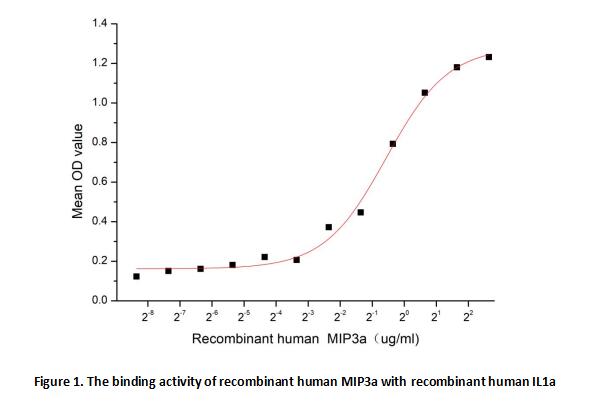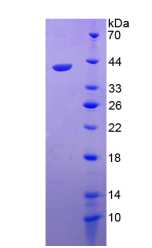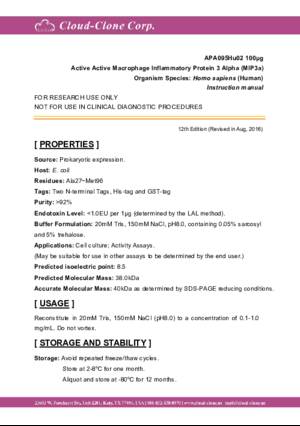Active Macrophage Inflammatory Protein 3 Alpha (MIP3a)
CCL20; CKb4; LARC; MIP3-A; SCYA20; ST38; Small Inducible Cytokine Subfamily A(Cys-Cys)Member 20; Beta-Chemokine Exodus-1; Liver And Activation-Regulated Chemokine
- Product No.APA095Hu02
- Organism SpeciesHomo sapiens (Human) Same name, Different species.
- Buffer Formulation20mM Tris, 150mM NaCl, pH8.0, containing 1mM EDTA, 1mM DTT, 0.01% SKL, 5% Trehalose and Proclin300.
- Traits Freeze-dried powder
- Purity> 90%
- Isoelectric Point8.5
- ApplicationsCell culture; Activity Assays.
- DownloadInstruction Manual
- UOM 10µg50µg 200µg 1mg 5mg
- FOB
US$ 346
US$ 864
US$ 1728
US$ 5184
US$ 12960
For more details, please contact local distributors!
ACTIVITY TEST

Macrophage Inflammatory Protein 3 Alpha (MIP3a) also known as Chemokine (C-C motif) ligand 20 (CCL20) or liver activation regulated chemokine (LARC) is a small cytokine belonging to the CC chemokine family. It is strongly chemotactic for lymphocytes and weakly attracts neutrophils. MIP3a is implicated in the formation and function of mucosal lymphoid tissues via chemoattraction of lymphocytes and dendritic cells towards the epithelial cells surrounding these tissues. It is expressed in several tissues such as peripheral blood lymphocytes, lymph nodes, liver, appendix, fetal lung. Expression of MIP3a can be induced by microbial factors such as lipopolysaccharide (LPS), and inflammatory cytokines such as tumor necrosis factor and interferon-γ, and down-regulated by IL-10. Besides, lnterleukin 1 Alpha (IL1a) has been identified as an interactor of MIP3a, thus a binding ELISA assay was conducted to detect the interaction of recombinant human MIP3a and recombinant human IL1a. Briefly, MIP3a were diluted serially in PBS, with 0.01% BSA (pH 7.4). Duplicate samples of 100 ul were then transferred to IL1a-coated microtiter wells and incubated for 2h at 37℃. Wells were washed with PBST and incubated for 1h with anti-MIP3a pAb, then aspirated and washed 3 times. After incubation with HRP labelled secondary antibody, wells were aspirated and washed 5 times. With the addition of substrate solution, wells were incubated 15-25 minutes at 37℃. Finally, add 50 µL stop solution to the wells and read at 450nm immediately. The binding activity of MIP3a and IL1a was shown in Figure 1, and this effect was in a dose dependent manner, the EC50 for this effect is 0.676 ug/mL.
USAGE
Reconstitute in 20mM Tris, 150mM NaCl (pH8.0) to a concentration of 0.1-1.0 mg/mL. Do not vortex.
STORAGE
Avoid repeated freeze/thaw cycles. Store at 2-8°C for one month. Aliquot and store at -80°C for 12 months.
STABILITY
The thermal stability is described by the loss rate. The loss rate was determined by accelerated thermal degradation test, that is, incubate the protein at 37°C for 48h, and no obvious degradation and precipitation were observed. The loss rate is less than 5% within the expiration date under appropriate storage condition.
GIVEAWAYS
INCREMENT SERVICES
-
 BCA Protein Quantification Kit
BCA Protein Quantification Kit
-
 Molecular Mass Marker for Protein
Molecular Mass Marker for Protein
-
 Monoclonal Antibody Customized Service
Monoclonal Antibody Customized Service
-
 Polyclonal Antibody Customized Service
Polyclonal Antibody Customized Service
-
 Protein Activity Test Experiment Service
Protein Activity Test Experiment Service
-
 Electrophoretic Mobility Shift Assay (EMSA) Experiment Service
Electrophoretic Mobility Shift Assay (EMSA) Experiment Service
-
 Buffer
Buffer
-
 Lentivirus Packaging Experiment Service
Lentivirus Packaging Experiment Service
-
 Adenovirus Packaging Experiment Service
Adenovirus Packaging Experiment Service
-
 Real Time PCR Experimental Service
Real Time PCR Experimental Service
-
 Spike RBD Protein (S-RBD)
Spike RBD Protein (S-RBD)
-
 Protein G
Protein G
-
 Protein A
Protein A
| Magazine | Citations |
| Medicine (Baltimore). | Increased Serum Levels of Macrophage Inflammatory Protein-3α and Cystatin A Predict a Poor Prognosis of Nasopharyngeal Carcinoma Pubmed:25396333 |
| Cancer | Serum chemokine network correlates with chemotherapy in non-small cell lung cancer PubMed: 25976768 |
| American Journal of Cancer Research | CCR6+ B lymphocytes responding to tumor cell-derived CCL20 support hepatocellular carcinoma progression via enhancing angiogenesis. pubmed:28560063 |
| Biological Research | In vitro chemokine (CC motif) receptor 6-dependent non-inflammatory chemotaxis during spermatogenesis 10.1186:s40659-018-0161-z |
| BioMed Research International | Indoleamine 2, 3-Dioxygenase (IDO) Regulates Th17/Treg Immunity in Experimental IgA Nephropathy |








